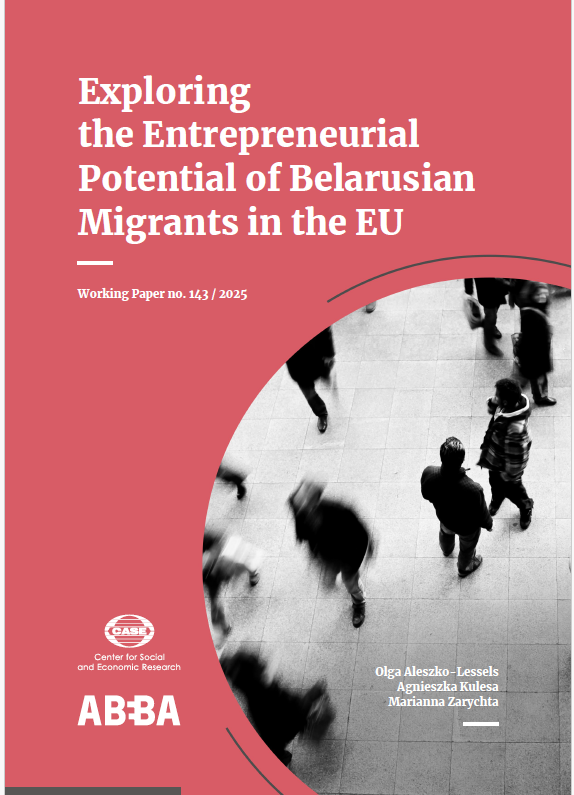
Exploring the Entrepreneurial Potential of Belarusian Migrants in the EU
This Working Paper aims to deepen the understanding of Belarusian migration to the EU, with a particular focus on entrepreneurship among Belarusian migrants.
acf domain was triggered too early. This is usually an indicator for some code in the plugin or theme running too early. Translations should be loaded at the init action or later. Please see Debugging in WordPress for more information. (This message was added in version 6.7.0.) in /home/case/domains/case.dev10.pro/public_html/web/wp/wp-includes/functions.php on line 6121 Homepage CASE
Homepage CASE
Selected values
422 Publications
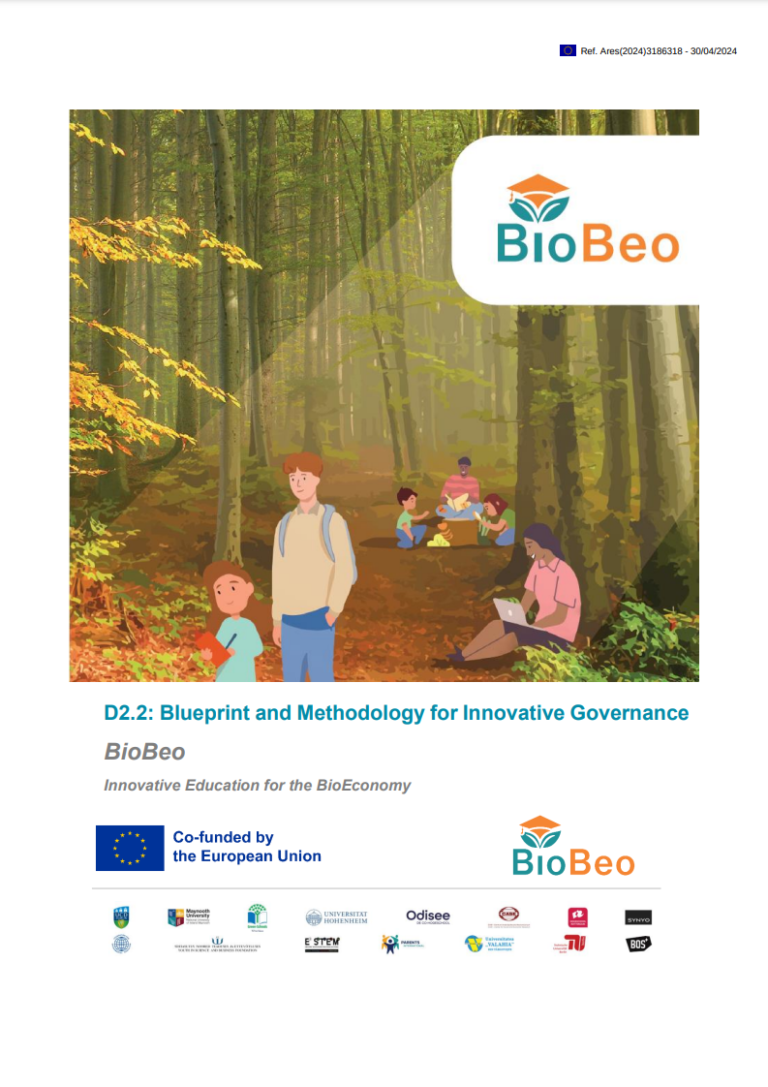
The publication is a key deliverable within the BioBeo project, funded under the Horizon Europe program. It provides a structured approach to integrating bioeconomy education into school curricula across different institutional and social environments. The report examines the actors involved in curriculum decision-making, from policymakers and school administrators to parents, students, and businesses. It categorizes existing procedures for introducing new content into schools, whether initiated by teachers, school heads, or government authorities. Key barriers—legal, organizational, and socio-cultural—are identified, along with strategies to overcome them. A central theme is the importance of inclusive governance in education, advocating for participatory decision-making that involves various stakeholders. Recommendations highlight the need for flexibility in curriculum design, adequate funding, professional support for teachers, and depoliticization of educational content. The report concludes by situating these findings within the broader BioBeo curriculum framework, reinforcing the role of education in fostering a sustainable and circular bioeconomy.
Labour, Migration and Social Policies
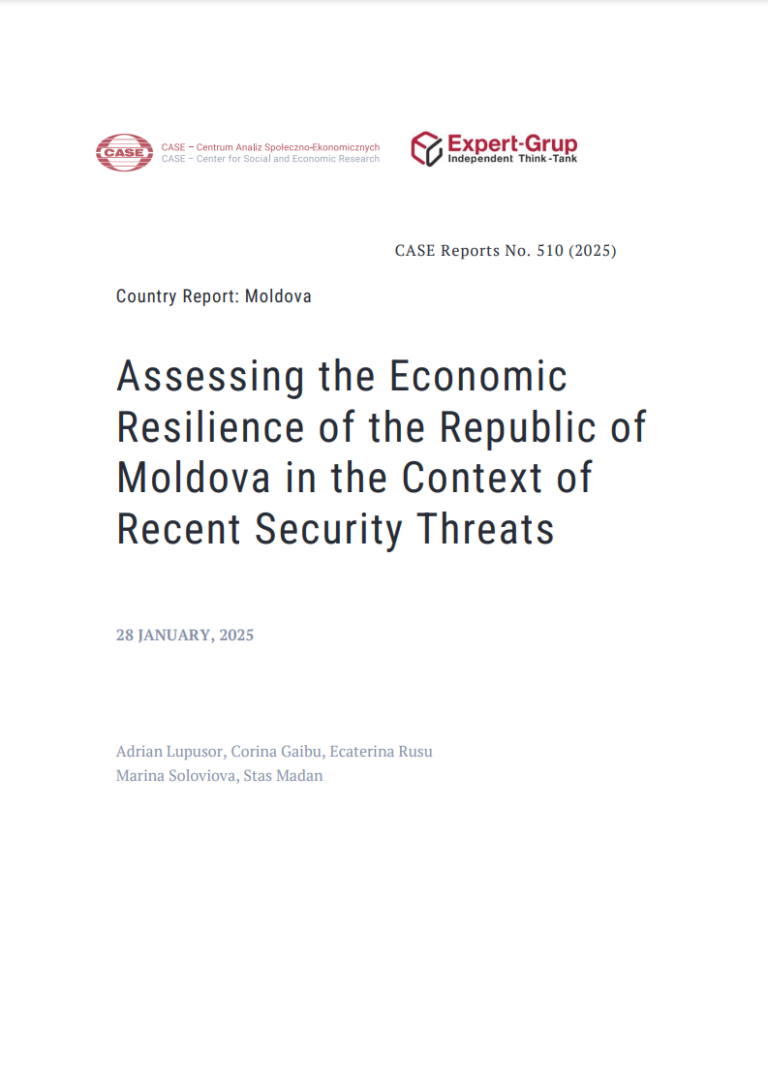
The report provides an in-depth evaluation of Moldova's capacity to adapt to crises such as the COVID-19 pandemic, the energy crisis, and geopolitical tensions resulting from Russia's war in Ukraine. It examines Moldova's position as a small, open economy with significant exposure to external shocks, highlighting vulnerabilities in energy imports, trade imbalances, and political stability. Key topics include Moldova's shift toward European integration, with milestones such as EU candidate status and expanded trade relations, which have helped reduce reliance on Russia. The report analyzes macroeconomic trends, financial sector stability, and energy dependency, identifying progress in institutional reforms and external support mechanisms that have bolstered the economy. However, ongoing challenges remain, such as inflation, fiscal deficits, and the unresolved Transnistria conflict, requiring targeted policy reforms and sustainable strategies for long-term resilience.
Trade & Macro
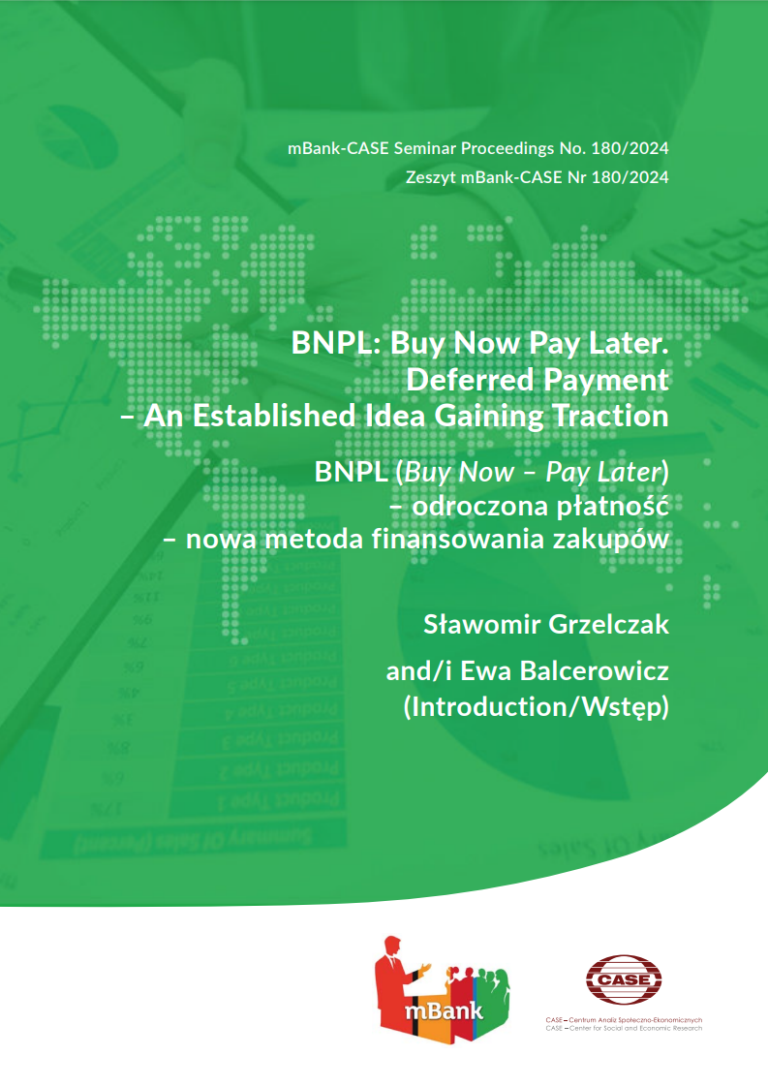
The publication examines the growing popularity and implications of the Buy Now, Pay Later (BNPL) financial model in Poland and globally. It features expert analyses and discussions from a seminar held on March 14, 2024, including insights from key players like PayPo, PKO BP, and the Credit Information Bureau (BIK). The publication focuses on: BNPL Evolution and Success: Originating in Sweden, BNPL has transformed global online shopping, offering deferred payment options as an alternative to credit cards. Poland's BNPL market, still in its infancy, shows rapid growth due to firms like PayPo, Twisto, and Allegro Pay. Comparison with Credit Cards: Unlike credit cards, BNPL offers simpler, targeted transactions that resonate with younger demographics and more women. It avoids the complexities and high fees associated with traditional credit cards, fostering higher adoption rates. Polish Market Dynamics: By the end of 2023, nearly 2 million Poles had used BNPL, representing 12% of active borrowers. PayPo leads the market with innovative features, while PKO BP introduces seamless banking integration for deferred payments. Challenges and Growth Potential: Despite its success, establishing a universal BNPL business model remains challenging. However, its consumer-centric approach signals continued growth, especially as it aligns with modern purchasing behaviors. The report provides a nuanced understanding of how BNPL reshapes financial landscapes, blending fintech innovation with traditional banking.
Fiscal Policies and Growth
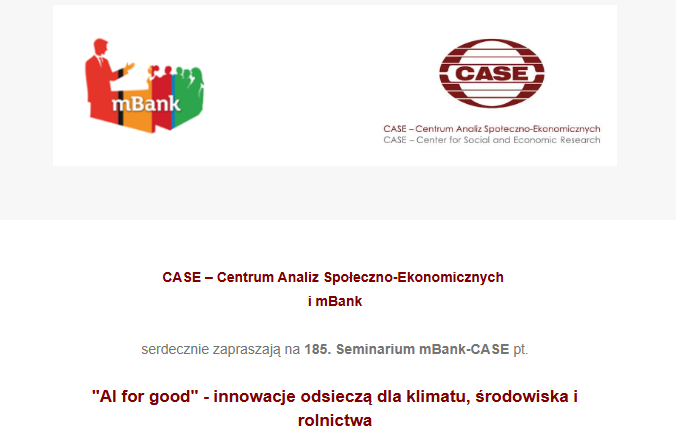
185th mBank-CASE Seminar April 3, 2025, 3:00 PM – 4:30 PM "AI for good" – innovations to help the climate, environment and agriculture The event will be held in Polish. Speakers: Dr. Ewa Balcerow
Sustainable policies
Online CASE CPI uses online data to measure price changes in Poland. It compares the average prices of goods from the past four weeks to the average prices from four weeks earlier and is updated weekly.
238 Projects
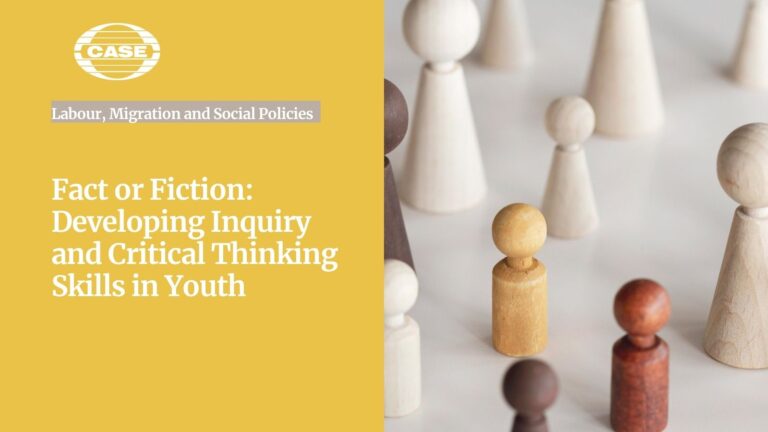
Our mission is to inspire youth aged 12-19 to practice intelligent disobedience—doing what’s right despite pressures. Our main objective is to equip adolescents with the skills to confidently navigate the rapidly evolving digital environment and develop key competencies and digital resilience for independent functioning in adulthood. The project will be based on the participatory approach to ensure our workshop scenarios are evidence-based and address the real needs of today's youth and educators. Outputs’ testing and implementation will equip participants with essential critical thinking skills for navigating a complex online world. On-site and international online multiplier events will ensure widespread dissemination of our activities and results, amplifying the impact among adolescents and educators. Participants will explore social impact, cognitive biases, and topics like economics and online culture, sharpening their ability to distinguish facts from opinions. Educators will gain insights into digital education tools and strategies for nurturing students’ CT and information verification skills. Deliverables include 18 CT workshops for youth, supported by a report with themed scenarios and exercises for integrating CT skills into daily lessons.
Labour, Migration and Social Policies
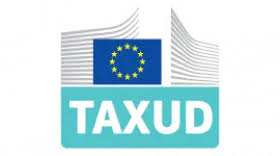
This study should consider possible improvements to the EU VAT system and assess their feasibility and likely consequences, based on the analysis of its current weaknesses, gaps, inefficiencies. As requested by the ToR, this requires a forward-looking analysis and prospective reflection, combined with and based on the retrospective assessment of the current situation. The study requires, on the one side, a thorough re-assessment of well-known problems of the EU VAT systems, which have been discussed for years by policymakers, scholars and in courts and tribunals, the solutions to which have already been long proposed in the academic as well as policy arena. On the other side, it requires a fresh view to identify new solutions to old problems, new problems and their possible solutions, as well as potential unknown problems, i.e. those that may appear in the future given the current economic, political and legal evolution and the megatrends of the EU and global society. Operationally, the activities needed to achieve the objectives of the study are straightforward. For each of the areas or angle of analysis, the study team will have to: Identify existing weaknesses and challenges of the EU VAT system, including those that may appear in the future given the likely evolution of the current situation. Design solutions to the problems identified. Assess the feasibility and consequences of the solutions identified.
Fiscal Policies and Growth
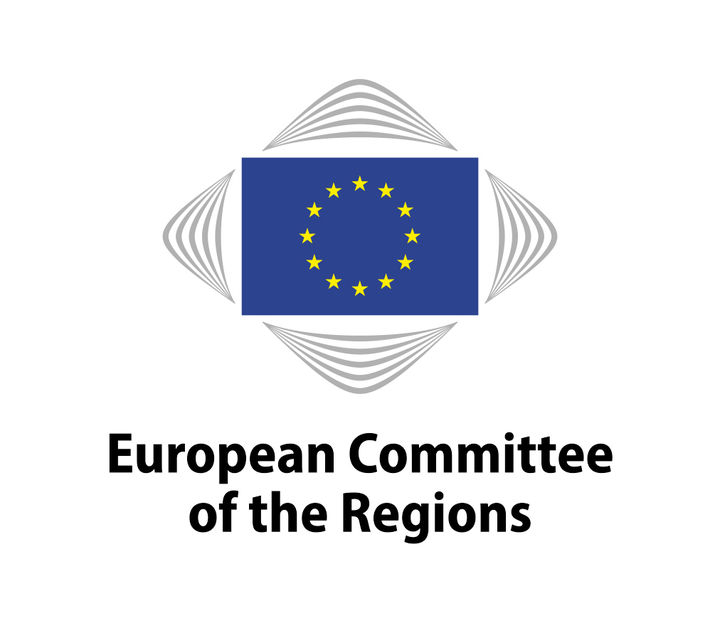
The aim of the study is to collect, map and share good practices, examples and success stories of investing in disaster resilience (including but not limited to in response to past disasters and the lessons learned from them) at local and regional level. The study focuses on collecting evidence on initiatives, good practice examples and measures taken by the NAT commission members to improve disaster resilience. The study will be built on interviews with NAT commission members based on a questionnaire. The study will also draw conclusions on the benefits of investing in disaster resilience and make some recommendations to local and regional authorities for moving forward based on the success stories collected from the members demonstrating that smart investment at local and regional level can make a difference in disaster risk reduction. The focus will be mainly, but not exclusively, on extreme weather events and climate-related disasters, given their growing frequency, intensity and impact. The study will contribute to knowledge sharing and exchange of good practices, by collecting and sharing success stories from and by members who have invested in reducing vulnerabilities and strengthening disaster resilience at local and regional level. As a repository of local and regional good practice examples, initiatives and measures relating to disaster preparedness and resilience, the aim of the study is also to feed into a bigger and longer-term project to map success stories of investing in disaster resilience on the ground.
Sustainable policies
You're now part of a community that values [your newsletter's focus]. Get ready to stay informed, inspired, and engaged with our carefully curated content.